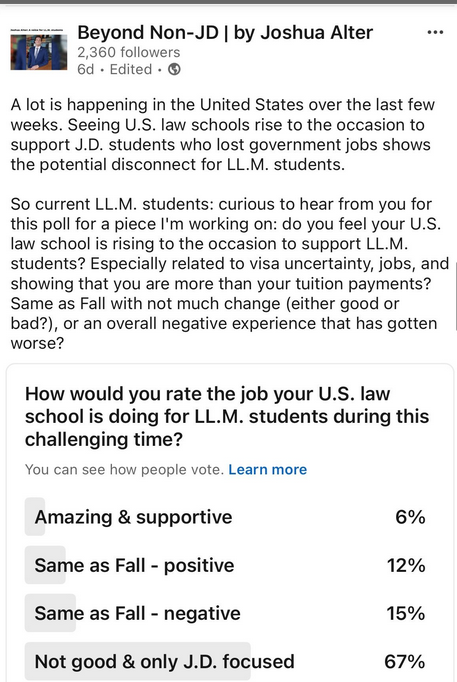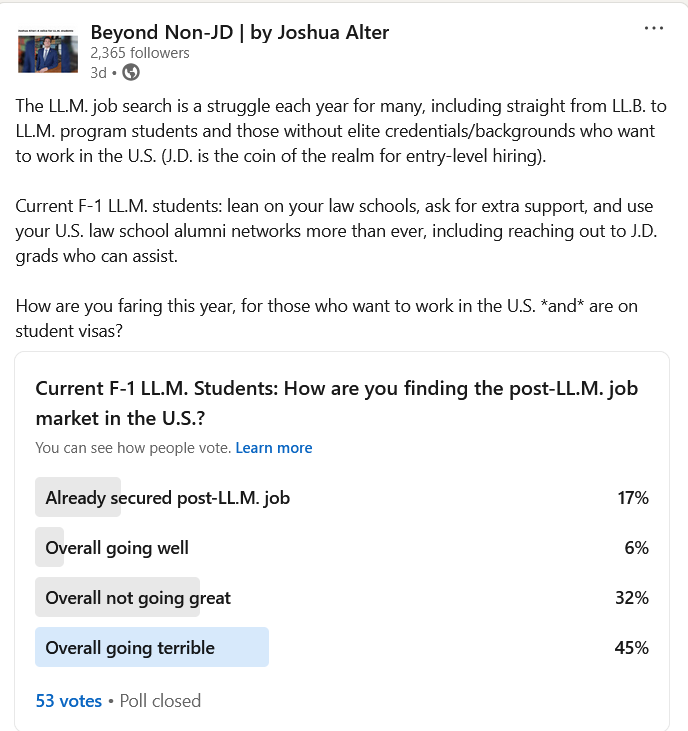Much has happened in the U.S. since the Spring semester began in January.
In January, I highlighted three challenges for U.S. law schools to pay attention to in order to maintain their collective status as a leading destination for LL.M. studies abroad.
In February, I focused on the first of those challenges, which were the three key acronyms for international LL.M. students: OPT, ABA and USD. The other two challenges highlighted were: increasing competition with other jurisdictions and geopolitical and domestic considerations.
Although 2025 is only a quarter of the way complete, the news is already full of stories related to higher education, international students, the legal profession and U.S. law and politics.
International LL.M. students have particular reasons to be nervous in the current climate.
Are U.S. law schools meeting the moment for this vulnerable and often overlooked group?
Teaching abroad, learning about global competition and U.S. perceptions
Since I started teaching abroad in December 2015, I have paid careful attention to the options LL.B. students have globally and their perceptions of current events in the United States. And my students, nicknamed LEALSers, have been so open with me about both topics, which has helped me with my own career planning and progression.
Each year, it seems like there are more options for where to study for LL.M. degrees globally. And as U.S. law schools face increasing competition, it feels like LEALSers and other prospective LL.M. students are in a buyer’s market.
More prestigious admissions? Bigger scholarships? Sometimes both? That’s a win.
Each year I write more letters of recommendation than the last. The big difference now? I am writing more letters of recommendation for schools outside the U.S. than inside. And I teach more students who openly share that the U.S. is not in their plans or at the top of their lists for LL.M. studies. Though they appreciate the common law, legal English and legal writing/analysis head start that LEALS provides.
And it is not a surprise that law students abroad paid careful attention during the run up to and aftermath of the 2024 U.S. elections. After all, many LL.M. students come to the U.S. specifically with hopes of landing jobs in the United States upon completion. OPT is a constant source of anxiety among F-1 students, especially in non-STEM fields like law.
And since January 2025, news from the U.S. has been an important part of LEALSers’ calculations as they evaluate admissions offers, scholarship options and global choices.
Meeting the moment, at least for J.D. students
U.S. law schools are becoming increasingly laser-focused on J.D. graduate employment outcomes. Which overall is a great thing, regardless of motives or incentives (U.S. News rankings focusing increasingly on outputs and bad negative press in the past, to name just two, certainly don’t hurt).
U.S. law schools, and higher education in general, are facing uncertain times. While the never-ending news cycle for U.S. law and politics has kept me busy as I prepare for my next LEALS course in Summer 2025, it has probably kept law school personnel even busier.
So, the news on LinkedIn was quite grim when 3Ls preparing to begin government jobs upon graduation began to lose those offers. Scrolling from Bali, I was heartened to see U.S. law school colleagues and institutions rally around supporting these 3Ls during such an uncertain time.
Meeting the moment, for LL.M. students?
LL.M. students can feel like an afterthought, even when things are going well, and operations are running smoothly. Given my background, I look at everything U.S. legal education related through a non-J.D. lens. And given the variance in LL.M. experiences, I was curious how the current group of international LL.M. students felt about their experiences, especially during the early Spring semester.
The consensus from current LL.M. students who speak with me and Beyond Non-J.D. readers did not surprise me. The poll results below reinforce that feeling. LL.M. students generally feel like their U.S. law schools can do more for them, and it seems that this moment has exacerbated that issue. As usual, the comparison to what they see happening for the J.D. students plays a role.

The Beyond Non-J.D. readers who participated in my latest poll have overwhelmingly struggled with their U.S. job searches as well. As I noted in the post, the LL.M. and a high-paying U.S. job are never a bundle package, and the LL.M. job search is often challenging.
But it seems like the combination of factors and U.S. law schools’ need to prioritize J.D. outcomes and students have more visibly left LL.M. students feeling like second-class students. Especially given all the other news and uncertainty surrounding H-1B, international students and the visa process.

How can law schools better meet the moment for LL.M. students?
I think schools are likely to draw a distinction between the 2024-25 and 2025-26 LL.M. classes.
For current students, I think helping them feel valued and included over the final few weeks of their experiences is crucial. Even if the job market means a potentially disappointing return to home jurisdictions or short-term (often low-paying) employment in positions LL.M.s were not expecting in the U.S.
From a business standpoint, these current students will soon be alumni and keeping good alumni relations is important. Additionally, incoming students may be connected with the current class, and you do not want to lose new LL.M. students because your graduating students suggest looking elsewhere to feel more welcome.
For the next class, I think it will be more important than ever to ensure an appropriate size class, add resources to the LL.M. program support structure and think intentionally about what LL.M. students mean to each school. Reach out to colleagues at schools where LL.M. students are thriving and happy to get a sense of what changes to make.
Conclusion
My overall sense from discussions and observations is that U.S. law schools may not be meeting the moment for their LL.M. students. The uncertainty, especially still relatively early in the cycle, may mean more amazing prospects with global options take a careful look at the U.S. as their choice for 2025-26.
U.S. law schools may not control immigration, employment, exchange rates or politics. But there is still plenty they can do to ensure that their LL.M. programs continue to thrive.


